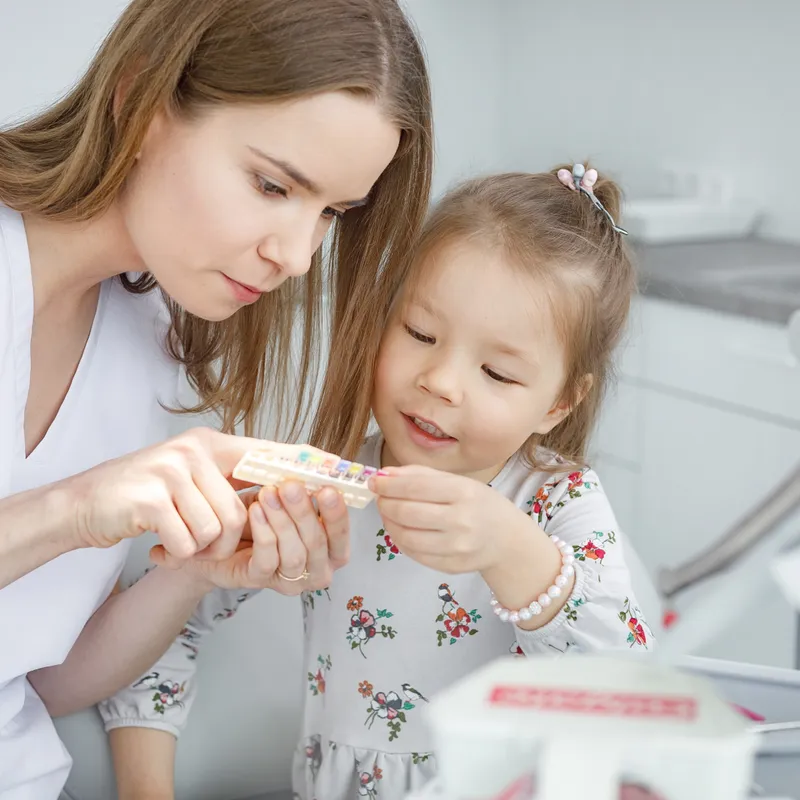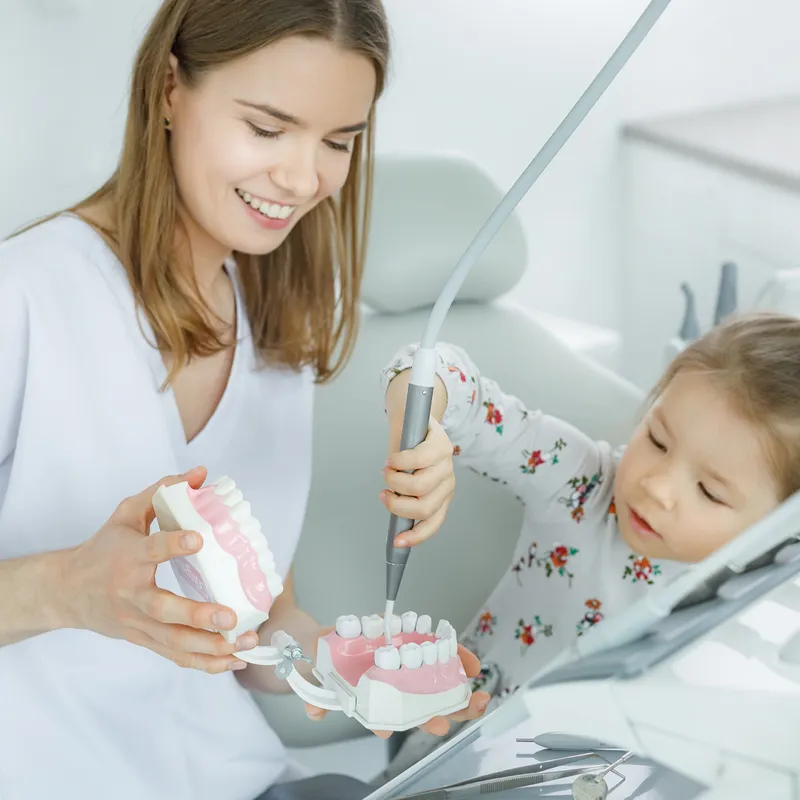


We pay special attention to children's dental health right from the first tooth popping up. We believe that teaching them good brushing habits early on and making friends with THEIR tooth fairy in childhood are the best ways to prevent big dental problems later in life.
We do everything we can to help kids feel comfortable sitting in the dentist's chair, working closely with parents. And we're proud to say that we often become friends with even the most scared little patients.
In cases where children have big dental problems and they're too scared to visit the dentist, treatment can be done under general anesthesia, administered by a team of professional anesthesiologists.
Why is it Important?
During this initial visit, the dentist carefully examines and assesses the child's primary teeth using a mirror.
It's a chance for the young patient to become acquainted with a new environment and the various dental tools they may not have encountered before.
For parents, this appointment is invaluable as the dentist shares essential information on caring for baby teeth at home and preventive measures against dental issues in the clinic.
It's completely normal not to know the correct way to care for teeth without causing harm, which is why we're here to help answer any questions you may have.
The most Affordable Path to Maintaining Healthy Teeth
Consistent and thorough daily oral hygiene are crucial in preventing tooth decay and other oral health problems. However, daily care alone may not suffice. Regular visits to the dentist every six months are highly recommended for a comprehensive evaluation of your child’s overall oral health.
During these preventive dental check-ups, the following assessments are conducted:
A comprehensive evaluation of overall oral health and dental condition.
Assessment of oral hygiene to detect any plaque buildup or tartar accumulation.
Examination of existing fillings to identify signs of wear, chips, or leaks.
Based on these evaluations, the dentist provides personalised recommendations for dental care. If necessary, specific oral hygiene procedures may be suggested. In the case of more serious issues, a customised treatment plan will be created to address your concerns effectively.
Baby teeth play crucial roles in a child's development—supporting chewing, aiding in speech, and shaping their smile. Yet, like permanent teeth, baby teeth are vulnerable to decay, which, if left untreated, can cause discomfort and affect not just the child but the entire family. Hence, we encourage parents to schedule their child's first dental visit as soon as their first tooth appears.
Approaches to treating baby teeth:
If decay or damage occurs, our dental team employs tailored treatments suitable for the child's age. We prioritise minimally invasive techniques to preserve affected teeth until natural replacement occurs, be it through fillings, root canal therapy, or extraction.
Our goal is to ensure that the treatment process is comforting and reassuring for both the child and their caregivers.
Our dentists strive to establish a personalised connection with each child, fostering trust and comfort to ensure a positive dental experience.
If primary caries in a baby tooth is missed, it often progresses to the root canal, potentially damaging the tissue, also known as the pulp. When this occurs, a child may either feel pain or experience no discomfort at all.
Regardless, such teeth must be treated in one of two ways, depending on the extent of the infection in the pulp.
The first method, pulpotomy, is used when the cavity has only affected the pulp in the crown of the tooth.
The procedure begins with the administration of local anesthesia, followed by the removal of all the damaged tissue in the tooth’s crown.
Once the bleeding is controlled, a filling is applied to seal the remaining healthy pulp in the root canals and restore the dental crown.
The second method, pulpectomy, is used when decay infects the entire pulp of the tooth. In these cases, under local anesthesia, all of the pulp is removed, followed by the filling of the root canals and the restoration of the dental crown.
Dental sealants are materials used to prevent tooth decay by forming a protective barrier over the grooves and crevices of teeth. This barrier prevents bacteria and carbohydrates from reaching these vulnerable areas, thereby safeguarding the teeth from decay. Sealants can also release fluoride, which enhances their effectiveness in preventing cavities. Research shows that timely application of sealants can reduce the risk of decay by up to 90%.
Sealants are typically applied to children's teeth between the ages of 6 and 14. The first and second permanent molars, as well as premolars and primary teeth, are ideal candidates for sealing. These teeth should be completely healthy and fully erupted.
Procedure Steps:
Cleaning: The tooth is cleaned with fluoride-free paste, rinsed, dried, and isolated from saliva.
Acid Etching: The fissures of the teeth are treated with orthophosphoric acid for about 30 seconds. The acid is then rinsed off, and the tooth is thoroughly dried with an air stream.
Applying Sealant: A thin layer of sealant is applied to the fissures using a brush or a special applicator and then hardened with light for about 20 seconds.
Finishing: The tooth is polished and coated with fluoride varnish.
It is crucial to revisit the dentist three months after sealant application. During this follow-up visit, the condition of the sealants and the quality of oral hygiene will be assessed.
If sealants have come off, the procedure can be repeated. The condition of the sealants will be evaluated during each subsequent dental visit. By following this preventive approach, you can significantly reduce the risk of tooth decay and maintain healthier teeth for your child.
Fluoride plays a vital role in preventing dental diseases by reducing enamel solubility and remineralizing demineralized dentin. This is especially crucial when patients visit the dentist regularly, allowing for the early detection of tooth decay at its initial stage—enamel demineralization. This early decay is often caused by poor oral hygiene and unhealthy dietary habits.
Benefits of Fluoride Application: A fluoride application, performed in the dentist's office, takes just a few minutes. This simple procedure strengthens the enamel and halts the demineralisation process. With effective cooperation between the dentist and the patient, fluoride treatments can prevent the need for fillings or significantly delay the onset of more severe dental issues. Incorporating fluoride treatments into regular dental check-ups helps ensure the long-term health of your teeth, reducing the risk of decay and the need for more invasive treatments.
Early Caries Treatment Without Drilling or Filling
What is ICON System Dental Caries Treatment?
ICON therapy is a revolutionary method for treating early-stage caries and white or yellow spots on the tooth surface without the need for drilling or pain. This treatment is similar to filling but doesn't require drilling into the tooth. Instead, the affected areas are infiltrated with a transparent resin, halting the demineralization process and visually reducing or eliminating enamel stains. This procedure is suitable for light enamel caries spots caused by poor oral hygiene, as well as longstanding enamel spots due to hypomineralization or fluorosis. The shape and color of the tooth remain unchanged; only the unwanted spots are corrected. While not all stains can be treated with ICON therapy, in cases of significant and deep defects, ICON can be combined with traditional filling. During a consultation, the dentist will assess your specific situation and recommend the appropriate treatment.
Procedure Steps:
Isolation: Teeth are often isolated using a rubber dam system, especially if defects are near the gums.
Cleaning: Teeth are cleaned with a brush and paste.
Etching: The first step involves etching the enamel spots with a special acid for 2 minutes to remove remnants of remineralized enamel. This etching process is usually repeated 1-3 times.
Washing and Drying: The teeth are thoroughly washed with water for 30 seconds and dried with ethanol for 30 seconds.
Resin Application: Infiltration resin is applied for 3 minutes, then hardened with a light for 40 seconds. This is followed by another 1-minute application and 40-second light curing.
Polishing: Excess resin is removed, and the teeth and interdental spaces are polished.
Results:
Before and after photos are taken to help the patient and dentist discuss the results. It's important to note that gums and teeth may be sensitive for a few days post-procedure, similar to after filling. Initially, the spots might not seem fully gone, or new spots may appear due to the teeth losing moisture during the procedure. Full evaluation of the results should be done after a few hours when the teeth have rehydrated from saliva. For optimal results, it's recommended to polish the teeth at least once a year or as needed. Additionally, maintaining regular professional oral hygiene and meticulous home care of teeth and interdental spaces is crucial.
Advantages of ICON Therapy:
No Drilling: Preserves healthy tooth structure.
Painless: The procedure is entirely pain-free.
Immediate Results: Early caries progression is halted, and white demineralisation spots are removed in a single visit.
Time-Saving: The procedure for one tooth takes about 45 minutes and is completed in a single visit with no need for repetition.
Management of uncooperative Child (10 min): €22
Initial Pediatric visit: €44
Personalized Oral Hygiene Instruction (15 minutes):€30
Removal of Plaque from Baby Teeth (15 minutes): €48
Restoration of Chewing Surface on a Baby Tooth: €69
Small Filling for Baby Tooth Contact Area: €74
Large Filling for Baby Tooth Contact Area: €79
Pulpotomy for Baby Tooth: €45
Treatment of Baby Tooth Canals (1 visit): €60
Treatment of Baby Tooth Canals (2 visits): €40
Extraction of Impacted Baby Tooth: €30
Simple Extraction of Baby Tooth: €45
Complex Extraction of Baby Tooth: €62
Treatment not completed due to the child's lack of cooperation: €40
Prosthetic Solutions for Baby Teeth: €170